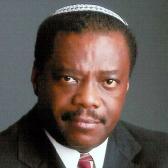CAPERS FUNNYE:
Antisemitism is something that I'm extremely sensitive to. Anti-anything-ism. Let's say, anti-humanism is something that I'm extremely sensitive to.
DANIEL GREENE:
Capers Funnye grew up in the African Methodist Episcopal, or AME, Church. When he was 17 years old, Funnye's minister encouraged him to become a preacher. But after a long path of self-discovery, Funnye converted to Judaism. Today, Funnye is a spiritual leader—the rabbi at Beth Shalom Ethiopian Hebrew Congregation in Chicago.
Welcome to Voices on Antisemitism, a free podcast series of the United States Holocaust Memorial Museum made possible by generous support from the Oliver and Elizabeth Stanton Foundation. I'm Daniel Greene. Every other week, we invite a guest to reflect about the many ways that antisemitism and hatred influence our world today. From his congregation on Chicago's south side, here's Rabbi Capers Funnye.
CAPERS FUNNYE:
I was raised in the AME church and I eventually found my way to Judaism. A very long path, but I've been on this path since 1970, and I tell you each day I learn more.
Before I started wearing a kipa [skullcap] and a small tallit [prayer shawl] everyday, I'd say I was Jewish and people would look. And Jewish people gave me a more curious look than other people.
Blacks and white Christians would kind of laugh: "You can’t be Jewish."
Because there was this mindset that the Jewish community in our society came from Eastern and Western Europe, and no real knowledge about the Jews of Spain, the Jews in Mexico, the Jews in Ethiopia, the Jews in India, and different parts of the world.
So my battle with racism really strengthened me for dealing with people's lack of understanding about my being Jewish. And it strengthened me when Jews didn't understand how or why I would want to become Jewish.
I grew up in the city and in the South. I'm a product of both cultures. So when I went to the doctor for the first time in South Carolina in 1967, the doctor's office still had one door for "coloreds" and another door for "whites."
And when we would go to the movies in South Carolina, blacks were relegated to the seats in the balcony.
So having lived through that, I became very sensitive to antisemitism. I have studied the Holocaust. I've studied about pogroms and Jewish history throughout the years, and have come to just appreciate the suffering that Jews have lived through, through so many, many centuries in so many places.
People don't understand that. They don't understand how the Jew was ghettoized and forced into vacuums. As an African American, I do. And so I am able to not only sympathize but empathize.
I think that the stereotype of what a Jew looks like needs to be really blown up. I think that we need to understand in American culture that Jews are not a race. But that Judaism is a faith. To me, Judaism is about the duties of the heart more so than the complexion of my skin. Judaism is how I interact and engage with other people, more so than simply having particular dietary habits. I eat lox and bagels all the time, but we don't use those dishes that are inherent to the Jews of Eastern and Western Europe to identify us as Jews.
African Americans and Jews—I'm very concerned about working to bridge those divides, but I go everywhere. I go wherever I'm invited to speak, in the Catholic community, the Protestant community, the Muslim community, the Jewish community. I believe that the message that everyone has some aspects of truth and righteousness, and nobody has it all. And when we find Muslims or Christians or Protestants, it doesn't matter. If they are pursuers of justice, then we need to seek ways to work with them.
In different lands the Jews found themselves in, they adopted elements of the cultures that they were in. It's no different than Jews of America. And so, Judaism has always been in a mixture, in a synthesis.
My experience in Judaism, my experience in Christianity, they're all synthesized within me. So in that way, I see the capacity to synthesize and understand different faith communities, and seek ways to work in a cooperative, as opposed to keeping everyone so separate and so divided.
DANIEL GREENE:
Voices on Antisemitism is a free podcast series of the United States Holocaust Memorial Museum. Join us every other week to hear a new perspective on the continuing threat of antisemitism in our world today. We would appreciate your feedback on this series. Please visit our website, www.ushmm.org.

